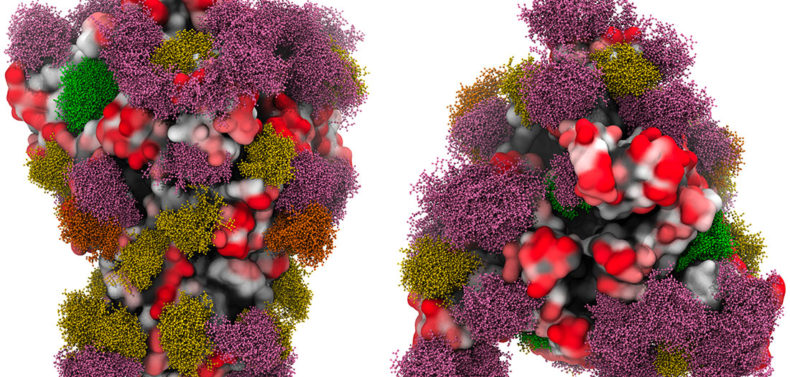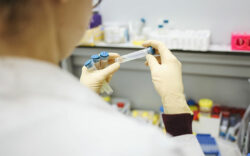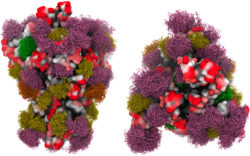Athens reached the 100-death milestone last week, almost a year into the COVID-19 pandemic. While cases and hospitalizations continue to decline, the virus has killed at least 22 Athens residents in the past few weeks. Deaths, which lag behind cases and hospitalizations, stood at 105 for Clarke County as of Feb. 16.
The seven-day moving average continued to fall to 33 new cases per day. There were a cumulative total of 11,737 confirmed cases in Clarke County, with an additional 2,027 positive rapid antigen cases, for a total of 13,754 cases in Athens to date.
Hospitalizations, at 434, continued to slow. Last weekend 134 patients were hospitalized for COVID-19, or 23% of all patients in Region E, which includes St. Mary’s Hospital and Piedmont Athens Regional. Sixty-nine intensive care beds were in use, or 93% of those available after hospitals recently expanded capacity.
Data from UGA professor Erin Lipp’s lab at the Center for the Ecology of Infectious Diseases showed that the amount of virus in local wastewater—collected from three wastewater treatment plants in Athens—showed viral loads continuing to decline.
At UGA, trends in the data show that community spread on campus may be decreasing. There were 115 positive cases for the week of Feb. 1–7, down from 181 the previous week, according to self-reported data from the Dawgcheck app. Positive cases via surveillance testing fell, with just 40 positive cases compared to an average of 60 cases in the two weeks prior, and UGA continues to keep the number of surveillance tests each week at above 2,400. Testing results at the University Health Center included a total of 218 COVID-19 tests, with 18 positive, for a positivity rate of 8.3%.
On the vaccine front, the Georgia Department of Public Health still hasn’t released an online scheduling tool for health districts, a move that should help more people make vaccination appointments without the frustration of long wait times on the phone. The move should also help reduce the strain on phone banks and websites. Previously, DPH said its goal was to have the tool available statewide by mid-February.
As of Feb. 11, Georgia had administered 1,353,978 vaccinations. In recent weeks, several announcements from the Biden administration, including securing additional doses of the Moderna and Pfizer vaccines, provide hope that more supply of the vaccine should be available in the coming weeks and months. The Johnson & Johnson vaccine, which will be reviewed by the Food and Drug Administration for emergency use on Feb. 26, provides additional hope that more supply will become available in the near future. Because it requires only one dose and no cold storage, public health experts are optimistic that the Johnson & Johnson vaccine, when offered alongside the other approved vaccines, will ultimately increase supply enough to get many more people vaccinated efficiently in the coming months.
According to a news release from St. Mary’s, the hospital recently requested an additional 2,000 doses but only received 100, and is not currently accepting new appointments for first doses. Front-line health-care workers and other first responders remain the top priority. On the bright side, the hospital said that side effects are minimal, and the vaccines appear to be effective against new variants of the virus so far.
St. Mary’s continues to be excited about the COVID-19 vaccine. We are confident it is safe and effective. We are honored to play our part in the nation’s largest vaccine rollout and appreciate the patience of our communities as we join other health care and public health organizations in navigating the current vaccine supply challenges. Over the last several days, we’ve heard from many community members who are interested in more information and we wanted to share some updates:
Vaccine information
Vaccine supplies are still limited from federal and state governments. Demand far exceeds supply worldwide. We currently do not have vaccine supplies to schedule any new first dose appointments but are prepared to administer more vaccines when supplies are available. St. Mary’s continues to work with the State of Georgia to obtain vaccine, but the State faces a huge challenge in fairly and equitably distributing vaccine. Georgia receives 146,000 doses a week to serve a population of 2 million who are currently eligible. For example, St. Mary’s recently requested 2,000 additional doses but received 100 due to limited supply availability. All 100 of those vaccines are committed for second doses to complete treatments. We appreciate the work state and federal authorities are doing to improve supplies and urge patience from our communities.
All workers in clinical and front-line roles have priority to receive the vaccine. To help keep everyone safe and meet existing patient care needs, we are first working to complete vaccination of front-line health care workers. This will help protect them so that we can later expand access to more people. In accord with State guidance and as supplies permit, we are making appointments only for our colleagues and first responders (EMS, fire and law enforcement) in five core counties in our service area.
We’re getting every dose we can, and following state direction on distribution. We are making plans to vaccinate as many community members as possible as soon as supplies are provided, in accordance with State priority categories. As soon as supplies allow, we plan to expand our vaccine clinics to our Medical Group patients age 65 and over.
One patient = two appointments. Because the currently authorized COVID-19 vaccines need two doses to provide maximum protection (the second dose is given 21 days later for the Pfizer vaccine and 28 days later for the Moderna vaccine), we schedule two appointments on the same call.
Larger quantities of vaccine supplies are coming. We are confidentthat national and state plans to improve vaccine distribution will be effective and know that everyone is working hard to make that happen. The goal is that everyone who wants to be vaccinated will be able to receive it over the coming months. We are also excited that additional COVID vaccines are under development and will possibly add to the available inventory needed to meet current and future demand.
The vaccine has been well-received and well-tolerated. Overall, our staff and medical staff have been receptive to being vaccinated. The vast majority of side effects we are seeing are consistent with those reported in clinical trials such as pain and redness at the injection site, feeling tired, muscle and joint aches, headaches, and low-grade fever. Most side effects resolve within 24-48 hours and those ages 55 and older reported fewer side effects.
We are watching the rise of COVID variants closely. We continue to follow experts at Trinity Health, CDC and WHO as they assess the impact of these new variants. So far, it appears existing vaccines continue to be effective at preventing severe illness. Reducing the rate of infection would also reduce the speed at which new variants arise, so please continue preventative measures such as masking, maintaining social distance, handwashing, and staying away from others when not feeling well.
Local COVID information
Case numbers appear to be declining. We are seeing a reduction in COVID case numbers across our region over the past 14 days. We are hopeful the decline is due in part to better compliance with community precautions since the holidays ended.
COVID-19 hospitalizations remain high but are easing. Currently, all area hospitals are near capacity, especially for critical care. Even so, the situation has improved compared to about two weeks ago, when area hospitals were frequently over capacity. Patients with COVID-19 continue to make up nearly a quarter of inpatients at St. Mary’s Hospital in Athens and about half of inpatients at Sacred Heart and Good Samaritan hospitals in Lavonia and Greensboro
Our hospitals are safe and open. We continue to provide all services and urge everyone to continue receiving care when you need it, from routine wellness checkups to emergency care. Our work to keep you safe includes entrance screening for everyone entering our facilities, mandatory masking, limited inpatient visiting, and virtual visits with our St. Mary’s Medical Group providers.
Next steps
We will continue vaccinating our staff, medical staff and community first responders as supplies permit.
As our supplies improve, we will expand our vaccination clinics to include more people within the State’s 1A priority tier.
We urge everyone to continue following standard COVID-19 safety precautions, even after being vaccinated: wear a mask, maintain social distance, wash hands, avoid gatherings, and stay home if sick.
The improvement in COVID-19 cases comes despite a student bar scene downtown that’s in full swing. The Red & Black reported that a new bar called The Warehouse held a grand opening Jan. 29 with hundreds of maskless patrons attending.
Co-owner Brian Cowart called ACC’s mask ordinance “excessive” and told the student newspaper he received an exemption to bar occupancy limits from Gov. Brian Kemp’s office because The Warehouse technically qualifies as a music venue. Like a number of other student-oriented bars, The Warehouse has opted out of the mask ordinance and does not require patrons to wear face coverings. Businesses are allowed to opt out under a compromise Kemp reached with the City of Atlanta over whether local governments can mandate masks.
Another bar Cowart owns, The Rowdy Goose, is among the 11 that police have cited for having too many people inside in violation of Kemp’s emergency order. Others include Bourbon Street, Buddha Bar, Centro Athens, Cloud, Double Barrel, On the Rocks, Sake Mama, Woodford, 1785 and 9d’s Bar.Incidentally, the two newer bars fill spaces that were previously occupied by 100 Proof and Hedges on Broad. Those now-closed bars’ owner, David Ellis Ippisch, is facing charges of kidnapping and rape. Police say Ippisch raped and possibly drugged a 21-year-old woman in a bar storage room in November 2019.
Like what you just read? Support Flagpole by making a donation today. Every dollar you give helps fund our ongoing mission to provide Athens with quality, independent journalism.










